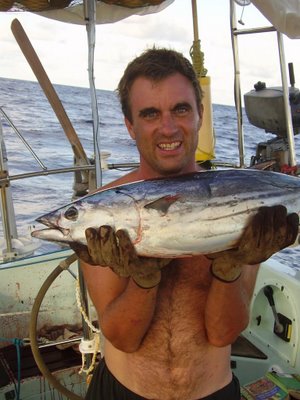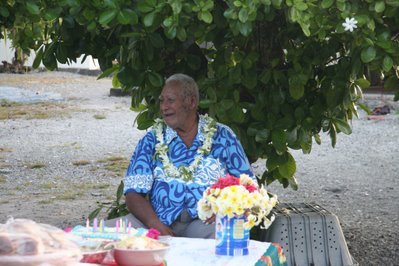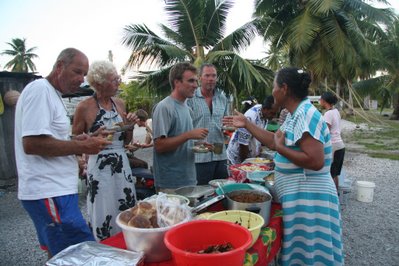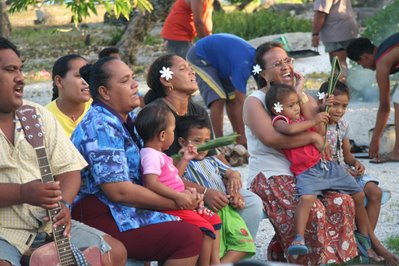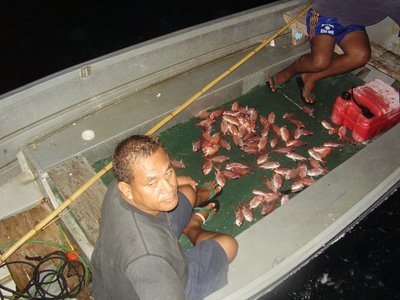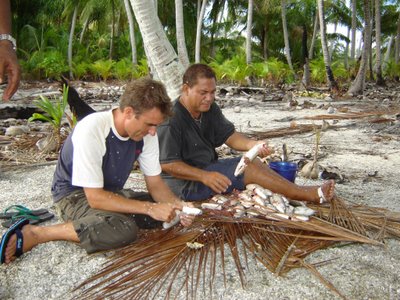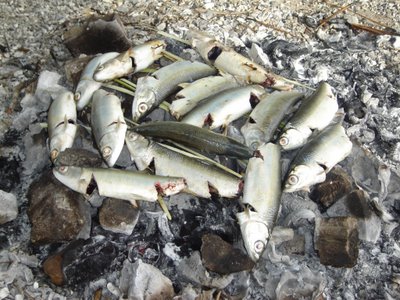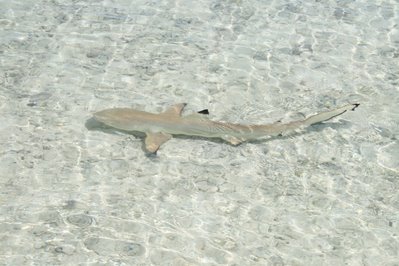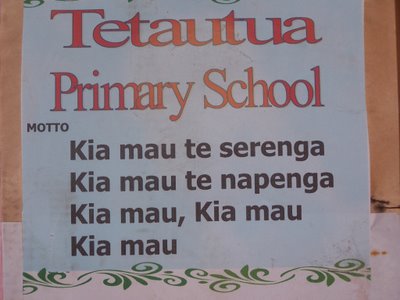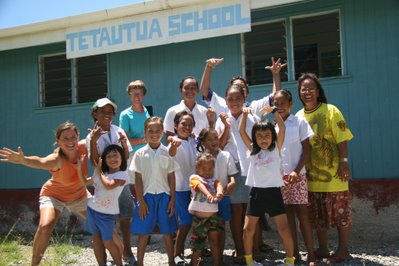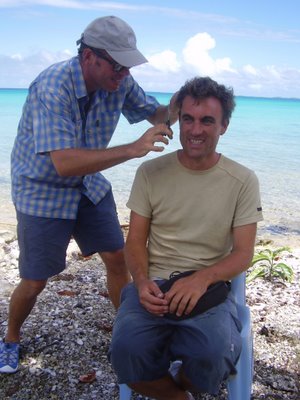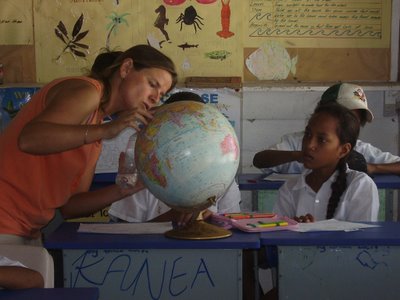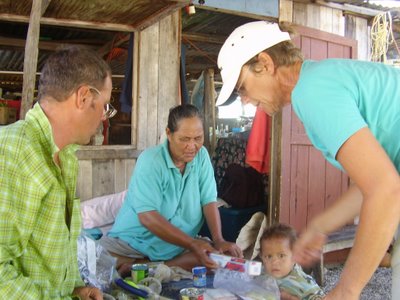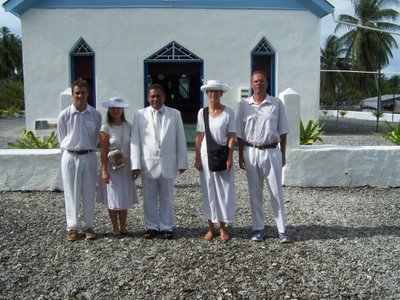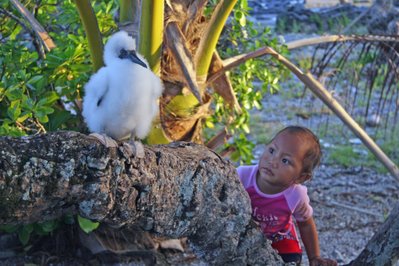Friday, September 15, 2006
Landfall in Apia, Samoa
We made landfall early yesterday morning. From the open sea, the anchorage looked very welcoming and the leading lights were clearly visible so we decided an entry in darkness was possible. We motored quietly in (well, as quietly as we can with our engine) and checked out the shapes of familiar hulls (Revision II, Zeferin and Noa amongst others) before we found our spot and dropped anchor.We woke to the strains of 'Glory, glory Alleluja' in brass band style as the local constabulary did their 0800 parade. Apia is a sight for sore eyes after the solitude and simplicity of Penrhyn. It's a busy but attractive town nestling between gentle slopes of tropical vegetation. Checking in was a joy as we made our way around the town to visit the various very friendly officials. There's all we need here including ice cream, internet and laundry. First impressions suggest an interesting place and very different from our last stop - we'll let you know.
Wednesday, September 13, 2006
Electric Storms
We've had a great sail so far; 15-20 knots of wind and a following sea. We barely touched the sails for the first five days, but finally roused ourselves yesterday to bring our course back towards Apia, by taking the pole down and changing from a run onto a broad-reach. Since then we've been speeding along, registering the best daily run of our little group - a respectable 153 miles, compared with 150 and 145 from Revision II and Noa. Sadly it's too little too late and when we arrive tonight the other boats will already have moved from the beer onto rum cocktails - something to look forward to then.
We set off from Penrhyn with a bright full-moon accompanying our night watches. Over the course of the passage, the moon has progressively risen later and last night in the dark, star-lit first-half of the night we were treated to spectacular flashes of lightning from a storm further north. Normally I feel uncomfortable being on a small boat with lightning flashes around. I guess I've heard too many apocryphal stories of yachts being damaged by lightning strikes, however last night we felt sufficiently far from the storm to enjoy the display from what felt like the safety of our cockpit.
Although the weather has been kind to us, making for a swift and easy passage, the trip has felt longer than the 6/7 days it'll turn out to be. When we set off I felt as though we were embarking on a quick hop between islands and hadn't prepared myself for the routine of watch-keeping and rhythm of the boat at sea. I think it's made the passage seem longer and consequently the anticipation of landfall much greater.
The fishing line will be deployed once again in the hope we can fill the fridge with a tasty wahoo before our arrival. The large tuna we caught on the first day fed us well, but its possible to have too much of a fresh fish and we were happy to finish it and move onto canned food for a change!
News has reached us of the death of the Tongan king. The cruising airwaves are full of rumours about the consequences, ranging from a half-year virtual shut-down of Tonga to a more reasonable week to two weeks of official mourning. Our correspondents in the capital, Will and Alyssa on Ragtime, report that the customs, immigration and port representative, all wore black arm-bands for their check-in yesterday but overnight the city has been transformed with shops being repainted in black and maroon, and the population dressing themselves in black. It's certainly going to be an interesting time to visit.
Position @ 7.30 local time (GMT-10): S13deg00' W170deg 19'
Distance to go: 96
We set off from Penrhyn with a bright full-moon accompanying our night watches. Over the course of the passage, the moon has progressively risen later and last night in the dark, star-lit first-half of the night we were treated to spectacular flashes of lightning from a storm further north. Normally I feel uncomfortable being on a small boat with lightning flashes around. I guess I've heard too many apocryphal stories of yachts being damaged by lightning strikes, however last night we felt sufficiently far from the storm to enjoy the display from what felt like the safety of our cockpit.
Although the weather has been kind to us, making for a swift and easy passage, the trip has felt longer than the 6/7 days it'll turn out to be. When we set off I felt as though we were embarking on a quick hop between islands and hadn't prepared myself for the routine of watch-keeping and rhythm of the boat at sea. I think it's made the passage seem longer and consequently the anticipation of landfall much greater.
The fishing line will be deployed once again in the hope we can fill the fridge with a tasty wahoo before our arrival. The large tuna we caught on the first day fed us well, but its possible to have too much of a fresh fish and we were happy to finish it and move onto canned food for a change!
News has reached us of the death of the Tongan king. The cruising airwaves are full of rumours about the consequences, ranging from a half-year virtual shut-down of Tonga to a more reasonable week to two weeks of official mourning. Our correspondents in the capital, Will and Alyssa on Ragtime, report that the customs, immigration and port representative, all wore black arm-bands for their check-in yesterday but overnight the city has been transformed with shops being repainted in black and maroon, and the population dressing themselves in black. It's certainly going to be an interesting time to visit.
Position @ 7.30 local time (GMT-10): S13deg00' W170deg 19'
Distance to go: 96
Monday, September 11, 2006
Last but not least
Well, our first 24 hours of sailing found us ahead of Noa - some achievement as they left before us and she's a fast boat, so we were quite elated about that. Today, however is a different story. They are further south than us and experiencing different weather. It seems they had good winds yesterday and last night and are now 30 miles ahead of us! Very annoying! Revision 2 are headed to Apia also, and are at the front of our little group. The competition is fun, but more than that, I like the feeling that friends are also out there. It's hard to describe what it's like when you've been on a long passage with other boats and, thanks to the radio net, you share the adventure and challenge. Then, depending who makes the best time, either you are watching out for them to make landfall, or they are waiting in the anchorage for you to arrive (preferably with a cold beer in their hand and a big laundrette in the background!) It's a unique and wonderful feeling and somehow all the trials and tribulations of the passage seem worth it. Not too many trials so far on this passage though. We had a couple of squalls yesterday and last night, but nothing major. The sea is pretty big and powerful today which always makes for more interesting viewing. I deigned to do some hand-steering this afternoon in an effort to make up some distance (the wind-vane yaws considerably) and I really enjoyed surfing down the waves. I sometimes feel the boat must surely get swamped by some of the bigger crests, but she always comes out on top.
We tuned into the net yesterday to find that disaster had struck our friends on Ragtime. They were making landfall in Tonga and were pushed onto the reef by a strong current. They spent 5 exhausting hours in the night attempting to pull the boat from the coral with the help of their dinghy and 4 anchors. Amazingly, they managed to do it, and both Will and Alyssa are ok, and Ragtime is still floating so things could be worse. We know how terrifying it must have been for them after our experience in Raroia which sounded like peanuts compared to their trauma! What I remember most from Raroia was being so grateful to Will and Alyssa for realising how dire our situation was and taking the time to talk us through our options on the net that fateful morning. We were counting down the minutes to net time, just desperate to talk to someone sensible who would reassure us and offer some objective advice, and they did. I wish we could have helped them on Friday.
We finished the fish tonight and I have seriously had enough of tuna for a while (possibly a lifetime!) Oh for a chicken breast or bacon sandwich! We know of a cruiser who put his fishing line out the other day and hooked a whale! Needless to say he lost the line!
We are currently sailing smoothly at 5-6 knots. We have the wind behind us and are 'wing on wing' ie American speak for 'goosewinging!'
Position @ 2145 local time (GMT-10): S11deg29 W164deg25
Miles to go: 450
We tuned into the net yesterday to find that disaster had struck our friends on Ragtime. They were making landfall in Tonga and were pushed onto the reef by a strong current. They spent 5 exhausting hours in the night attempting to pull the boat from the coral with the help of their dinghy and 4 anchors. Amazingly, they managed to do it, and both Will and Alyssa are ok, and Ragtime is still floating so things could be worse. We know how terrifying it must have been for them after our experience in Raroia which sounded like peanuts compared to their trauma! What I remember most from Raroia was being so grateful to Will and Alyssa for realising how dire our situation was and taking the time to talk us through our options on the net that fateful morning. We were counting down the minutes to net time, just desperate to talk to someone sensible who would reassure us and offer some objective advice, and they did. I wish we could have helped them on Friday.
We finished the fish tonight and I have seriously had enough of tuna for a while (possibly a lifetime!) Oh for a chicken breast or bacon sandwich! We know of a cruiser who put his fishing line out the other day and hooked a whale! Needless to say he lost the line!
We are currently sailing smoothly at 5-6 knots. We have the wind behind us and are 'wing on wing' ie American speak for 'goosewinging!'
Position @ 2145 local time (GMT-10): S11deg29 W164deg25
Miles to go: 450
Saturday, September 09, 2006
Riding the rapids
Yesterday we reluctantly prised ourselves away from Penrhyn for the 850 mile passage to Apia in Samoa. We could easily have spent a month there, but the weather outlook appears promising and there's still a lot to see (and miles to cover) before we head to New Zealand for the hurricane season. We planned to leave with Noa, but found our anchor chain caught under a coral ledge. After trying various untangling maneuvers we accepted the inevitable and dived to free the chain by hand. It was a fortunate that we'd become accustomed to swimming alongside black and white tip sharks during our stay as I barely noticed their presence circling not far from the offending coral head - I don't think I'd have been quite so oblivious a week ago.
By the time the chain was freed the sun was high in the sky, making it straightforward to spot the isolated coral patches on our trip back across the lagoon. As we approached the pass, it became clear that the tide was rapidly ebbing out of the lagoon and once caught by the flow there was little we could do other than aim for the deeper water in the middle and enjoy the swift ride out. Another yacht was anchored outside, waiting for slack water - she'll be the fifteenth boat to visit Penrhyn this year - a bumper year. We wished them an enjoyable stay and set course for Apia.
We've had a pleasant but slow trip so far, the sea is calm, the wind is around 8-10 knots and we've been making 3-5knots running goose-winged under full main and poled-out genoa. We were welcomed back into deep waters by a large pod of white-nosed dolphins and we landed a large tuna around sunset yesterday.
Its the first time we've had to use the gaff to land a fish. We bought the gaff way back in Gibraltar and its been patiently rusting away waiting for its moment of glory. Although we haven't been short of fresh fish during our stay, its great to start the passage with the fridge full of fish and break open the wasabi and soy sauce once again.
Position at 7.30 local time (GMT-10): S9deg 25' W159deg 27'
Distance to Apia: 769
By the time the chain was freed the sun was high in the sky, making it straightforward to spot the isolated coral patches on our trip back across the lagoon. As we approached the pass, it became clear that the tide was rapidly ebbing out of the lagoon and once caught by the flow there was little we could do other than aim for the deeper water in the middle and enjoy the swift ride out. Another yacht was anchored outside, waiting for slack water - she'll be the fifteenth boat to visit Penrhyn this year - a bumper year. We wished them an enjoyable stay and set course for Apia.
We've had a pleasant but slow trip so far, the sea is calm, the wind is around 8-10 knots and we've been making 3-5knots running goose-winged under full main and poled-out genoa. We were welcomed back into deep waters by a large pod of white-nosed dolphins and we landed a large tuna around sunset yesterday.
Its the first time we've had to use the gaff to land a fish. We bought the gaff way back in Gibraltar and its been patiently rusting away waiting for its moment of glory. Although we haven't been short of fresh fish during our stay, its great to start the passage with the fridge full of fish and break open the wasabi and soy sauce once again.
Position at 7.30 local time (GMT-10): S9deg 25' W159deg 27'
Distance to Apia: 769
Thursday, September 07, 2006
Away from Atoll!
We made landfall in Penrhyn on Tuesday 30th August, and it has been a week full of activities and discoveries - some perplexing, some delightful, all fascinating. We entered the pass easily and once we had checked in at the main village of Omoka, we motored gingerly across the lagoon to the lovely anchorage off the village of Tetautua. Here, we have received a welcome so warm and disarming, it has made us feel very special and a little awkward at times. They don't have many yachts visiting here (too far north) and have only had 14 this year to date so we are still rather a novelty. On the second night, we were invited to one of the elder's 79th birthday celebration. Most of the village was there and all the cruisers (there's 5 yachts here). Nick and I took a salad with us and added it to the mountain of food they had prepared. They had bbq'd lobsters and mackerel and, to our dismay, there was also turtle meat (they are plentiful here but it is still illegal).We were welcomed by everyone, shared prayers with them, sang 'Happy Birthday' and 'For He's a Jolly Good Fellow' to the birthday boy, and then while some of us chatted and enjoyed birthday cake, others played their instruments and sang some traditional songs. At the end of the evening my salad bowl was returned clean and full of left-over bread buns and vegetables.The following day began with a wind-surfing lesson for me from Tom on 'Quantum Leap' which was swiftly followed (I was actually picked up from the surfboard) by an exclusive trip for us with the Reverend Roy (the minister here) to the small pass to the north of the village where there is reputed to be excellent snorkeling. We dropped into the water and for a little while we shared a world with sharks (black tip and white tip), rays, Napoleon fish, barracuda and trevally, but the most startling aspect of the experience was the coral which totally dominated the seascape with its abundance and colour. There was no sand to be seen; it was as if we had swam into an underwater mountain range of coral and we felt quite small amongst the valleys and hills, peaks and cliffs.
That evening, all the male cruisers were invited by some locals to a lobster hunting expedition on the reef which sounded quite treacherous and yielded 2 lobsters before it finally had to be abandoned due to foot-injury. Some might say this was Bad Fairy Payback for not inviting the female visitors! This society is patriarchal in its traditions; women are said to bring bad luck to a fishing trip - something that Rita and I have luckily had the opportunity to disprove during our stay.
So, another day, another trip. This time the health officer, Joseph or 'OJ' to his friends, and two younger men gave up most of their day to take 4 of us (Kika and Noa) to the north of the lagoon to fish and teach us how to look for pearls and clams and to husk coconuts.The concept of time here is fairly relaxed (not a problem as it's not like we've got trains to catch) so after some delay and the usual preamble which seems obligatory before embarking on any activity here, we set off. The clams are large and abundant, and easily found in the shallow waters of the lagoon. They are on average about 8" long and the fleshy lips are beautiful iridescent colours. The nugget of muscle is tasty and a pleasant texture, and can form the basis of a good curry as Noa proved later in the week. We also opened and ate oysters straight out the shell - normal Pacific and pearl oysters or 'pee-pees'.Various methods were used to catch parrot fish, squirrel fish, milk fish and trevally which we then barbequed on a deserted motu and garnished with grated coconut. I spent time in the shallows just looking at the life on the sea-bed. You think it's all sand and rock but if you make yourself immobile and just float on the surface the place comes alive. You see shells move as the hermit crabs begin to lumber about, families of little fish poke their heads out from behind coral florets, shrimps resume endless excavations, and all the time, the black tip sharks patrol.I saw an amazing sight which I found incredible when I first read about it months ago and was amazed to witness here in Penrhyn. A small (about 2") white goby sits by a hole in the seabed. Periodically, a grey shrimp, (about 1.5") appears from the hole with its 'shovel' of pincers full of sand. The goby feeds on creatures that the shrimp disturbs with its excavations and, in return, the virtually blind shrimp relies on the goby to be its sentinel. On emerging with its load, the busy shrimp touches the goby with its antennae for reassurance. If the goby senses danger, it flicks the shrimp with its tail and both retreat hastily into the hole. How about that for a bit of mutual back-scratching! I think it's called a 'mutual symbiotic relationship', ie: both parties benefit. I actually saw this happen in 5 or 6 different places. At one point I was so engrossed that I didn't notice a blacktip almost brush past my left arm until it was there in front of me. A 'mutually impervious relationship' - at least that's what he thought (I hid my shock pretty well!)
These trips are totally dependent on the kindness and generosity of the locals who happily give up their time to show you their atoll. There is also, it must be said, a rivalry between senior members of the village to befriend cruisers. We have puzzled over the reasons for this which, as there is no material benefit to befriending us, must simply be status. This competition fuels their enthusiasm and willingness to give of their time and resources. It's important, we have quickly come to realise, not to abuse their generosity and to try to diffuse any competition by giving some time to all parties - not always easy and sometimes a little awkward. That the town is so small only exacerbates the problem. Everyone seems to know the other's business down to how many cans of beer you have bought from the town on 'The Other Side'. Omoka is a short trip across the lagoon, but the rivalry between there and Tetautua is fierce. When we arrived, though the officials who checked us in were pleasant and helpful, they implied that over on 'The Other Side' we had to beware as the people were prone to theft and other vices which is, happily, complete fiction. It reminds me of the perpetual rivalry between Grimsby and Hull which sit on opposing sides of the river Humber (the south side's the best!) This is paradise with a twist: stay for a couple of days and you see paradise, stay for a couple more and you see the twist. It seems that life in a small town has its drawbacks, whether your view is the Pacific or Pontefract. The population of the town is much depleted - there are only about 60 inhabitants these days. Jobs and adventure in Australia and New Zealand often prove difficult to resist, and as a result there are constant, valiant efforts being made to continue the dwindling traditions and culture. The language is Maori but it is a dialect which is unique to Penrhyn and is spoken throughout although English is also spoken and, of course, this has enabled greater contact between us and the locals. A group of villagers of all ages are involved in taking a tour of New Zealand and Australia where they will perform dancing, singing and traditional music in order to raise money for a new tractor. We were lucky enough to be invited to a rehearsal in the Sunday school one evening. Those performers with small children brought them along and either put them on a mat on the floor to one side where they fell asleep, or else they simply slept in their parent's arms while they belted out the songs. The singing was wonderful and accompanied by some accomplished ukulele playing. The dances were similar to other Polynesian arrangements we have seen but both the group of young girls and boys who danced seemed to enjoy it so much and were so unselfconscious and energetic, it was a delight to watch. We felt so privileged to be there and were almost speechless when the band leader stood up at the end of the rehearsal and thanked the 'yachts' for coming to listen!
In return for all the time and generosity we have been lucky to receive, we have made efforts to help in any ways we can.Nick has explained the mysteries of OJ's computer to him, Walter has, to his and our surprise, become the local barber,I spent Monday morning teaching in the local school and Rita and I have done some very satisfying 'mutually symbiotic' trading for pearls.We have cleared our lockers of useless t-shirts, sheets and towels which the locals really need, and we both have a small collection of pearls which WE really need!Sunday morning was quite special. The Cook Islanders take the Sabbath very seriously - no work at all to be done during the day (I had to hang the washing on the starboard side of the boat away from prying eyes!) We were welcome to attend the church service (the second of three services held each Sunday) at 10am but we all had to wear white, it being the first Sunday in the month which is traditionally 'White Sunday'. Apparently this dates back to missionary times when the 'whites' came and spread the word! So, of course, we had to borrow white clothes from the locals - Rita and I even had to wear hats! We actually felt very special and could understand how it gave the event significance. It could also have had something to do with the fact that they were the first clean clothes we've worn in weeks! We were formally but warmly welcomed to the church in Penrhyn dialect and in English. It was a long service but punctuated by the wonderful, unaccompanied, melodious singing.We are thinking of leaving for Samoa tomorrow. The weather looks good and though we've had a great time and will never forget the experience, it's time to go. I have set up a correspondence with the school principal here and hope to get a dialogue going between the pupils of Tetautua school and my new school, wherever that may be. We've got a lot to learn from each other.
That evening, all the male cruisers were invited by some locals to a lobster hunting expedition on the reef which sounded quite treacherous and yielded 2 lobsters before it finally had to be abandoned due to foot-injury. Some might say this was Bad Fairy Payback for not inviting the female visitors! This society is patriarchal in its traditions; women are said to bring bad luck to a fishing trip - something that Rita and I have luckily had the opportunity to disprove during our stay.
So, another day, another trip. This time the health officer, Joseph or 'OJ' to his friends, and two younger men gave up most of their day to take 4 of us (Kika and Noa) to the north of the lagoon to fish and teach us how to look for pearls and clams and to husk coconuts.The concept of time here is fairly relaxed (not a problem as it's not like we've got trains to catch) so after some delay and the usual preamble which seems obligatory before embarking on any activity here, we set off. The clams are large and abundant, and easily found in the shallow waters of the lagoon. They are on average about 8" long and the fleshy lips are beautiful iridescent colours. The nugget of muscle is tasty and a pleasant texture, and can form the basis of a good curry as Noa proved later in the week. We also opened and ate oysters straight out the shell - normal Pacific and pearl oysters or 'pee-pees'.Various methods were used to catch parrot fish, squirrel fish, milk fish and trevally which we then barbequed on a deserted motu and garnished with grated coconut. I spent time in the shallows just looking at the life on the sea-bed. You think it's all sand and rock but if you make yourself immobile and just float on the surface the place comes alive. You see shells move as the hermit crabs begin to lumber about, families of little fish poke their heads out from behind coral florets, shrimps resume endless excavations, and all the time, the black tip sharks patrol.I saw an amazing sight which I found incredible when I first read about it months ago and was amazed to witness here in Penrhyn. A small (about 2") white goby sits by a hole in the seabed. Periodically, a grey shrimp, (about 1.5") appears from the hole with its 'shovel' of pincers full of sand. The goby feeds on creatures that the shrimp disturbs with its excavations and, in return, the virtually blind shrimp relies on the goby to be its sentinel. On emerging with its load, the busy shrimp touches the goby with its antennae for reassurance. If the goby senses danger, it flicks the shrimp with its tail and both retreat hastily into the hole. How about that for a bit of mutual back-scratching! I think it's called a 'mutual symbiotic relationship', ie: both parties benefit. I actually saw this happen in 5 or 6 different places. At one point I was so engrossed that I didn't notice a blacktip almost brush past my left arm until it was there in front of me. A 'mutually impervious relationship' - at least that's what he thought (I hid my shock pretty well!)
These trips are totally dependent on the kindness and generosity of the locals who happily give up their time to show you their atoll. There is also, it must be said, a rivalry between senior members of the village to befriend cruisers. We have puzzled over the reasons for this which, as there is no material benefit to befriending us, must simply be status. This competition fuels their enthusiasm and willingness to give of their time and resources. It's important, we have quickly come to realise, not to abuse their generosity and to try to diffuse any competition by giving some time to all parties - not always easy and sometimes a little awkward. That the town is so small only exacerbates the problem. Everyone seems to know the other's business down to how many cans of beer you have bought from the town on 'The Other Side'. Omoka is a short trip across the lagoon, but the rivalry between there and Tetautua is fierce. When we arrived, though the officials who checked us in were pleasant and helpful, they implied that over on 'The Other Side' we had to beware as the people were prone to theft and other vices which is, happily, complete fiction. It reminds me of the perpetual rivalry between Grimsby and Hull which sit on opposing sides of the river Humber (the south side's the best!) This is paradise with a twist: stay for a couple of days and you see paradise, stay for a couple more and you see the twist. It seems that life in a small town has its drawbacks, whether your view is the Pacific or Pontefract. The population of the town is much depleted - there are only about 60 inhabitants these days. Jobs and adventure in Australia and New Zealand often prove difficult to resist, and as a result there are constant, valiant efforts being made to continue the dwindling traditions and culture. The language is Maori but it is a dialect which is unique to Penrhyn and is spoken throughout although English is also spoken and, of course, this has enabled greater contact between us and the locals. A group of villagers of all ages are involved in taking a tour of New Zealand and Australia where they will perform dancing, singing and traditional music in order to raise money for a new tractor. We were lucky enough to be invited to a rehearsal in the Sunday school one evening. Those performers with small children brought them along and either put them on a mat on the floor to one side where they fell asleep, or else they simply slept in their parent's arms while they belted out the songs. The singing was wonderful and accompanied by some accomplished ukulele playing. The dances were similar to other Polynesian arrangements we have seen but both the group of young girls and boys who danced seemed to enjoy it so much and were so unselfconscious and energetic, it was a delight to watch. We felt so privileged to be there and were almost speechless when the band leader stood up at the end of the rehearsal and thanked the 'yachts' for coming to listen!
In return for all the time and generosity we have been lucky to receive, we have made efforts to help in any ways we can.Nick has explained the mysteries of OJ's computer to him, Walter has, to his and our surprise, become the local barber,I spent Monday morning teaching in the local school and Rita and I have done some very satisfying 'mutually symbiotic' trading for pearls.We have cleared our lockers of useless t-shirts, sheets and towels which the locals really need, and we both have a small collection of pearls which WE really need!Sunday morning was quite special. The Cook Islanders take the Sabbath very seriously - no work at all to be done during the day (I had to hang the washing on the starboard side of the boat away from prying eyes!) We were welcome to attend the church service (the second of three services held each Sunday) at 10am but we all had to wear white, it being the first Sunday in the month which is traditionally 'White Sunday'. Apparently this dates back to missionary times when the 'whites' came and spread the word! So, of course, we had to borrow white clothes from the locals - Rita and I even had to wear hats! We actually felt very special and could understand how it gave the event significance. It could also have had something to do with the fact that they were the first clean clothes we've worn in weeks! We were formally but warmly welcomed to the church in Penrhyn dialect and in English. It was a long service but punctuated by the wonderful, unaccompanied, melodious singing.We are thinking of leaving for Samoa tomorrow. The weather looks good and though we've had a great time and will never forget the experience, it's time to go. I have set up a correspondence with the school principal here and hope to get a dialogue going between the pupils of Tetautua school and my new school, wherever that may be. We've got a lot to learn from each other.
Slide show
Subscribe to:
Comments (Atom)

